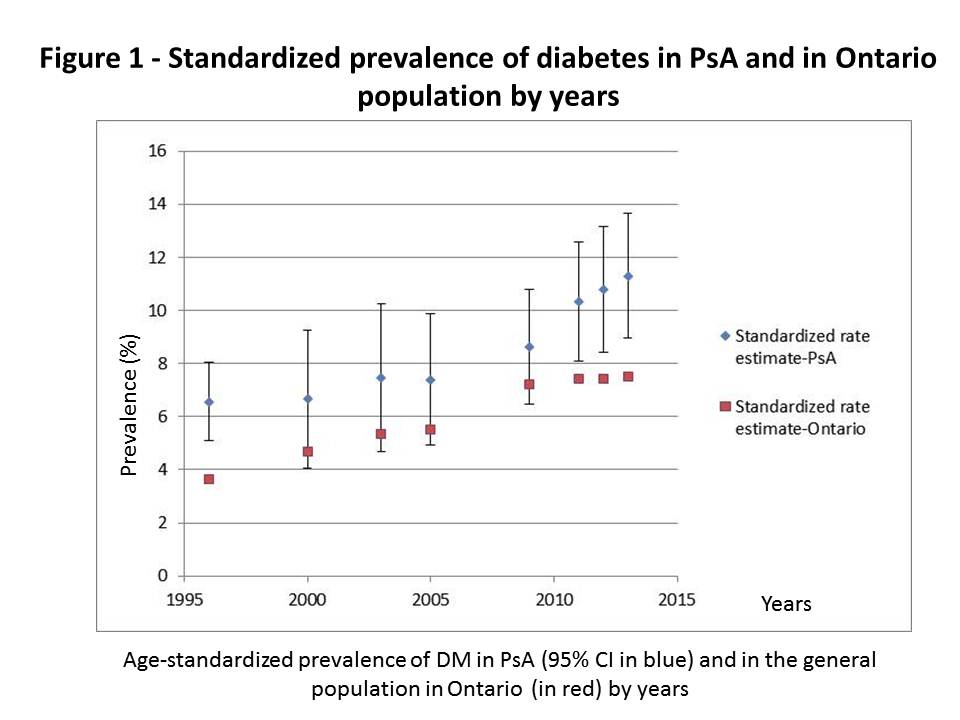Session Information
Session Type: ACR Concurrent Abstract Session
Session Time: 2:30PM-4:00PM
Background/Purpose:
To estimate trends in the prevalence of diabetes mellitus (DM) in patients with
psoriatic arthritis (PsA) in comparison to the general population in Ontario,
Canada and to assess whether the levels of disease activity and
inflammation over time predicts the development of DM in these patients.
Methods:
A cohort analysis was conducted in patients followed in a large PsA clinic from
1978 to 2013. The collected information included demographics, lifestyle
habits, medical history and disease-related outcomes. DM was defined as the use
of medications for DM or elevated blood glucose or HbA1C levels. The prevalence
of DM in patients followed up in the cohort was compared with data obtained
from the Canadian Community Health Survey (CCHS), a cross sectional examination
of health status conducted from 1995 to 2013 in Ontario. Age-standardized
morbidity ratio (SMR) of DM was calculated for years with available CCHS data.
For the assessment of risk factors for DM, patients with an existing diagnosis
of the disease at clinic entry were excluded. The following time-weighted
arithmetic mean (AM-) levels were assessed as predictors of incident DM: tender
and swollen joint counts, number of dactylitic digits, psoriasis area and
severity index (PASI) and erythrocyte sedimentation rate (ESR). Cox
proportional hazard models stratified by age-group at clinic entry and
controlled for sex, cumulative steroid dose, duration of PsA and body mass
index were used to compute the multivariate relative risk (RR) for incident DM.
Results:
A total of 1305 patients were included in the analysis. The standardized
prevalence of DM in 2013 was 11.3% (95% Confidence Interval (CI) 8.9%, 13.7%)
and the SMR compared to the general population was 1.43 (95% CI 1.2, 1.7,
p=0.002). An increase in the point-prevalence of DM over the past two decades
was observed (Figure 1). Of the 1065 patients who were included in the time to
event analysis, 73 patients developed incident DM. This cohort had a total of 11006 person-years of follow-up, with
a mean of 10.3± 8.9 years per
person.
On
multivariate analysis AM- tender joint count (RR 1.68, 95% CI 1.2-2.36,
p=0.003) and AM-ESR (RR 1.21, 95% CI 1.04-1.41, p=0.01) predicted the
development of DM.
Conclusion:
The prevalence of DM is increased in patients with PsA compared to the general
population with a gradual increase in the prevalence over the past decades. The
risk of developing PsA is predicted by exposure to elevated levels of
inflammation over time.
To cite this abstract in AMA style:
Eder L, Chandran V, Cook RJ, Gladman DD. High Level of Inflammation Predicts the Development of Diabetes Mellitus in Patients with Psoriatic Arthritis [abstract]. Arthritis Rheumatol. 2015; 67 (suppl 10). https://acrabstracts.org/abstract/high-level-of-inflammation-predicts-the-development-of-diabetes-mellitus-in-patients-with-psoriatic-arthritis/. Accessed .« Back to 2015 ACR/ARHP Annual Meeting
ACR Meeting Abstracts - https://acrabstracts.org/abstract/high-level-of-inflammation-predicts-the-development-of-diabetes-mellitus-in-patients-with-psoriatic-arthritis/

